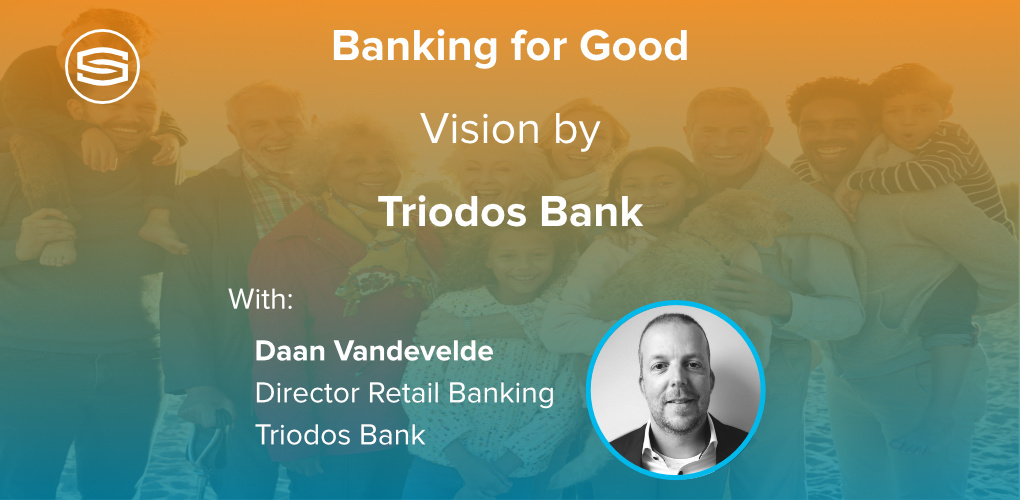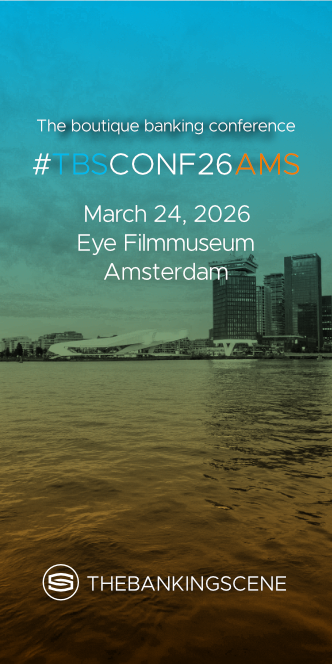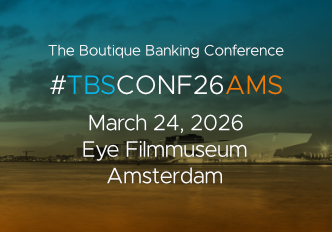
Insights & Opinions
Banking for Good - a Vision by Triodos Bank
Tue, 07 Dec 2021


There are no excuses to wait until the end of the year to invite Triodos Bank, with one of the main themes of 2021 being "Banking for Good". On December 2nd, we invited Daan Vandevelde, Director Retail Banking of Triodos Bank.
Triodos Bank's mission statement is "to make money work for positive social, environmental, mental and cultural change"; it has human dignity at its core.
As they are a member and co-founder of the Global Alliance for Banking and values, value-based banking isn't a new concept. Daan: "We have a clear definition of purposeful banking, Banking on Values or value-based banking. We put the focus on the three P's, "people planet and prosperity" at the very core of the bank. Products and services need to be designed and developed to meet the needs of people and safeguard, at the same time, the environment and society in its broadest sense".
To give an example, Triodos just launched on the COP26 their ambitious net zero Plan, called AsOneToZero. The goal Is to reach the net zero target by 2035, for the entire loan and funds investments portfolio’s, focusing on 4 components,:
- Reduction of property-based emissions (both for for business & mortgage lending)
- Invest in green prower
- Growth of natural resources to sequester carbon and supporting biodiversity
- Reduce carbon intensity in our whole portfolio abd community and build a movement around it
He explicitly stated that achieving this purposeful banking comes with the generation of a reasonable profit. Unlike most banks, they don’t see profit as a standalone objective and certainly not as the most important one, but as proof of a healthy business. Therefore profit maximisation is not a goal.
Sustainable and ESG industry initiatives are merely a good start
Daan agreed that the industry’s efforts on ESG positively affect our environment. However, in the same sentence he admitted it is not going far enough.
"The adoption of sustainability, or ESG more in general, by the banking industry is, in my opinion, still goes along with the status quo of the current financial and economic model where growth and maximizing profits are the ultimate goals", explained Daan. "It's clear that if we continue like this, we will cross the boundaries at a certain moment of our planets and create reversible effects of which global warming is the most visible."
With the Towards Sustainability Label created by the financial sector in Belgium as an example - Triodos participated in preparatory workgroups - Daan clarified that instead of starting from the present situation and sighing how much effort the sector is already doing , the industry could with much more ambition define what finance needs to do for a carbon neutral economy. Many sustainability labels still don’t exclude fossil fuels.
Daan: "With the current investments and loans that the banks already grant, we already reach the 1.5-degree limit that we have set ourselves through the Paris agreements, although this is the ultimate barrier that we should not go over."
When the audience asked about the transition costs and potential economic risks, Daan rightfully replied that not taking action would turn the bill exponentially higher in the long run.
He believes that the first step should be defining what kind of world we want to live in, and a second step how to adapt to achieve that goal. In this scenario, banks would become the driving force behind evolution in mobility, food and agriculture, transport and construction for the greater good.
Investments: from an exclusion strategy to a positive selection process
In July, we heard about a positive screening of investments in our session with ABN AMRO.
As for Triodos Investment Management, frontrunner is sustainable investments, they again moved the needle in sustainable transition in oktober 2018 out of the conviction that to truly invest for a sustainable future, they need to invest in companies that actively contribute to solving our most pressing sustainability challenges.
It is not enough to invest in ESG best-in-class companies that, within their sector, may be least damaging. As such, the Triodos impact equity and bond funds go beyond conventional environmental, social and governance (ESG) screens and norms-based exclusions to ensure that portfolio construction is positively driven by solutions to global sustainability challenges.
Their selection is based on 7 transition themes:
- Health and wellbeing
- Sustainable food and agriculture
- Sustainable mobility and infrastructure
- Circular economy
- Sustainable innovation
- Social inclusion and empowerment
- Renewable resources
After this positive selection, Triodos' strict minimum ESG standards are applied (purely article 9 of SFRD), so the exclusion of companies that make an income out of, for instance, fossil fuels, weapons, tobacco.
Finally, a financial analysis is brought together with a sustainable analysis for the final selection of investments.
Triodos publishes every asset they invest in on their website, each linked to the UN Sustainable Development Goals, ensuring complete transparency towards their customers and society.
Daan: "Banks have an enabler role, and that's why transparency is so important to give insight into the products and what lies behind them to enable the customers to make a well-found decision in the end. For me, it is in the hands of the consumer that is deciding".
This strategy was rewarded an 85% score by Fairfin, a non-profit that aims for a new financial system as a benchmark for a more sustainable world for people and the planet. This score sets Triodos as the most sustainable bank in Belgium, before vdk bank, which scored 62% and Argenta(61%). To put this into perspective: the big banks all scored below 50%.
"Stop regulating the solution, start tackling the problem instead"
Triodos Bank was very present in the COP26 discussions because they believe that they could not realise their ambitions on their own. It requires a movement, including one from the community and their customers, but also every single bank, in their opinion.
Daan: "We believe that net-zero targets should become mandatory for all banks and based on science-based targets. No free targets; they should be controllable and manageable. Next to the target in itself, we also think there is a need for mandatory transition plans."
Regulators and Central Banks should go beyond climate stress testing and reporting by banks from a risk point and recognise the impact and role of the sector in the transition by what banks decide to finance or not. They can steer the sector incentivising or penalising banks based on their behaviours related to climate change. This is, according to Daan, necessary to make a real change.
Besides their investment portfolio, Triodos Bank also has ann important credit business, like mortgages. Also, the mortgage business is entirely focused on energy efficiency, both for new constructions and for renovations. To fulfil its role as an enabler to a better future, Triodos Bank incentives customers with a reduction on their credit rate as a function of the energy efficiency of their house in case of a purchase, or the efforts they make in improving the energy efficiency of their building in a renovation. The conditional reduction is acquired once customers' commitments are proven with an official energy label.
What about their support for agriculture? Examples in The Netherlands showed that this sometimes conflicts with carbon ambitions. Again, Daan emphasised tackling the problem instead of starting with the status quo through investing in the conversion of an agriculture to support rather than threaten nature. "We have to work on other aspects too, like the transition towards small plant-based food production and waste reduction. We have a long list of focus themes and activities we want to invest in but for sure, intensive agriculture is excluded."
Whilst addressing climate change is fundamental, Daan highlights we must reduce emissions in a way that respects the social inclusion of all people alongside planetary boundaries, enabling a just transition.
Conclusion
Once again, I learned a lot about the banking industry's capabilities for moving society to its better self. The many initiatives that Triodos Bank supports or initiated were eye-opening.
Does this mean that there is nothing left to improve? No, take, for example, digital banking. Although they only have 2 branches in Belgium, Daan explained that moving to a full-digital business model is challenging. Despite the +90% of customers that have embraced digital banking, Daan did acknowledge the potential conflict with the values of Triodos Bank, of being available for all.
The mere fact that Daan explained this shows me just how high they value transparency in everything they do.


